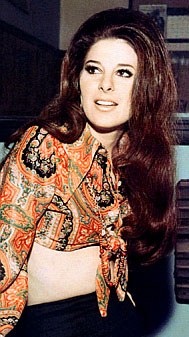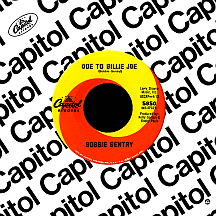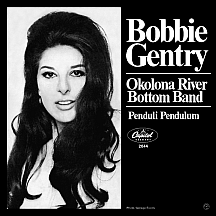BOBBIE GENTRY
Ode to Billie Joe
Two lines from an astonishingly popular late 1960s hit song caught the public's attention, becoming a conversation-worthy pop culture riddle: '...he saw a girl that looked a lot like you up on Choctaw Ridge...and she and Billie Joe was throwin' somethin' off the Tallahatchie Bridge.' Just what did these backwoods companions toss into the water below? The mystery has gone unresolved and will continue as such since Bobbie Gentry, the composer and singer, intended it that way. These lyrics aren't the point of the song anyway; it's all about a family's reaction, while sitting around the dinner table, to the more shocking news of young Billie Joe McAllister's fatal jump off the bridge, treated as casual conversation while they '...passed around the blackeyed peas' and helped themselves to '...another piece-a apple pie.' "Ode to Billie Joe" revealed a story with many details hidden between the lines and left to interpretation. With this recording Gentry achieved instant acclaim in the summer of 1967, emerging as if a seasoned pro with a detailed game plan.
Roberta Lee Streeter had no city to claim as a birthplace; somewhere near Woodland, Mississippi in Chickasaw County is the closest bet. Her parents split up and she spent several years living on her grandparents' Chickasaw farm. Church spirituals caught her ear and she studied piano as a youngster, later adding guitar, bass and banjo; listening to semi-distant radio stations in New Orleans provided the inspiration to write songs based on her rural surroundings. In the early '50s she lived with her father in Greenwood, Mississippi, then moved to California in 1957 to be with her remarried mother in the Palm Desert area. King Vidor's 1952 film Ruby Gentry (Jennifer Jones played the title role), a favorite of Roberta's as a teenager, supplied a professional name. By the mid-'60s she had done some modeling, attended UCLA in Los Angeles and danced in Hawaiian singer Johnny Ukulele's Las Vegas show, which inspired her to start her own island-style group, booked into lounges in California and Nevada.
In the summer of 1966 she made her first record for Titan, a label in Hollywood. Jody Reynolds (an early rock and roller who'd scored a top ten hit in '58 with "Endless Sleep") had done one single for Titan and followed it with a pair of duets credited to Jody and Bobbie; "Stranger in the Mirror" and "Requiem for Love" could be described as midtempo folk-rock, with Reynolds handling the lead and Gentry providing slightly more than backing vocals. While performing in various dives in the spring of '67 she met singer Bobby Paris; he'd been signed to Capitol Records (only one single resulted) but had clicked with producer Kelly Gordon (a singer who'd just done an ill-fated single under the name Joe Bananas). Bobby helped Bobbie record a demo tape of her bluesy rock number "Mississippi Delta" and promised to get it to someone at the label. Capitol's top dogs were impressed with the song and signed her to a contract.
"Ode to Billie Joe" was recorded as a B side at the Capitol Tower just off Hollywood and Vine in July '67. Without any frills, just Bobbie, her acoustic guitar and enough lyrical content to stretch the song to seven minutes' length, expectations were low. Yet atmospheric strings were added by arranger Jimmie Haskell and Gordon managed to edit the song to just over four minutes...still too long by AM radio standards! Pigeonholing her into a category was difficult - was she a pop act? Blues? Country? The best explanation might be that she was a resourceful southern U.S.A. singer who drew from nearly every style of music. Regardless, the decision was made to push "Ode" as the A side; within weeks it knocked The Beatles' "All You Need is Love" off its number one pop chart perch (it also hit the R&B top ten and country top 20).
In September while the single rode the crest, Bobbie performed "Ode to Billie Joe" on The Smothers Brothers Comedy Hour. She'd become a bona fide phenomenon...a few weeks later her debut album (same title as the song) pushed the Fab Four's Sgt. Pepper's Lonely Hearts Club Band out of the way on the album charts. Though the real focus is the nonchalant attitude about the presumed death of the presumed unstable McAllister boy who, we presume, was the family's daughter's boyfriend, you couldn't have predicted the mysterious whatever-it-was they threw off the Tallahatchie (a real bridge in Leflore County, Mississippi) would still be the subject of heated discussions decades later.

So where does a person go after conquering the music world? Downhill seems to be the only direction. "I Saw an Angel Die," a much less intriguing musical piece with a brilliantly unique singer at the center, met with indifference. The Jody and Bobbie single was reissued on Titan as Bobbie Gentry and Jody Reynolds, but there were still no takers. "Okolona River Bottom Band," released after Halloween, gained interest at radio and with record buyers...and rightfully so. It's a fun, bluesy sing-along (once you catch on to precarious wordplay like 'I told you society, green apple pie-ety, Delta variety') that peaked mid-chart under the vast shadow of Gentry's blockbuster. Grammy Awards nominations were announced and Bobbie received seven (represented in the top categories, Record of the Year and Song of the Year), all for "Ode." The '68 event was held on the world's rarest magical day, February 29, and she won three times (for Best New Artist, Best Vocal Performance, Female and Best Contemporary Vocal Performance, Female, those last two basically the same, with identical nominees, duplicated per NARAS's haphazard, ever-changing rules).
Along with a large group of investors (some of them other singing stars), Bobbie became part owner of the NBA's brand new Phoenix Suns basketball franchise. "Louisiana Man," an actual country song (but not so much the more relaxed way Bobbie performed it) made a brief chart appearance in April (it had been a top ten C&W hit for Rusty and Doug in 1961). Later in the year someone at Capitol decided to team her with one of the label's top country acts. "Mornin' Glory," her first duet with Glen Campbell (she composed it and got top billing), arrived with hopes high but didn't sell as well as anticipated. When they followed it with a remake of The Everly Brothers' "Let It Be Me" (Glen's name first this time), Bobbie finally nabbed her second top 40 hit.
A late 1969 single turned out to be her runner-up-most-remembered magnum-opus. "Fancy" told of a poor southern girl who made her way in life, at Momma's behest, with painted eyes and lips, red satin dresses and this advice: 'Just be nice to the gentlemen, Fancy, and they'll be nice to you.' A solo top 40 hit, it provided her with Grammy nom number eight (in a pop category like all the others) in 1970. There was one more hit duet with Campbell, the Everly standard "All I Have to Do is Dream" in early '70 (she was listed above Glen again), which wound up being her only top ten country hit. Also that year, "He Made a Woman Out of Me," a song written by Fred Burch and Don Hill, and the John Wilkins tune "Apartment 21," made minor impact. Maybe they should have gone with Gentry originals!
During this time, she endured a four-month marriage to casino tycoon Bill Harrah. Then several failed releases took her through the end of her Capitol contract in 1972. The Bobbie Gentry Happiness Hour aired on CBS for four weeks in June 1974 (she'd already done a summer variety series for Britain's BBC in '68 and '69). Her notorious signature song was made into a 1976 movie directed by Max Baer (also known as The Beverly Hillbillies' Jethro Bodine); Ode to Billy Joe (a different - more masculine? - spelling of the name) starred just-out-of-his-teens idol Robbie Benson (as Billy Joe) and Glynnis O'Connor (as Bobbie Lee). The film offered a few possible answers to the questions contained in the song's lyrics, but nothing really held water and most folks far and wide preferred to keep the discussion going. The original song reappeared on the charts for several weeks while a newly recorded but unnecessary soundtrack version by Gentry on Warner Bros. followed in its footsteps.
"Steal Away," a remake of Jimmy Hughes' hit from '64 produced by Rick Hall at the FAME studio in Muscle Shoals, Alabama with strings arranged by Jimmy Haskell, was unleashed in early 1978, about the time Jim Stafford (of "Spiders and Snakes" fame) was booked to open for Bobbie in Las Vegas. After a whirlwind romance, the two were married and had a son, Tyler Gentry Stafford, her only child, but divorce came shortly after the baby's birth. At some point in the 1980s, Bobbie dropped out of sight, though every once in awhile some hardy investigative reporter manages to confirm her continued existence through a random family member, real estate agent or...gypsy fortune teller? Meanwhile, "Ode to Billie Joe" occasionally rears its ambiguous head as a popular topic of conversation. Both Bobbie Gentry's entry into the public eye...and exit from it...are shrouded in mystery.



